By:
- Christine Clark
Published Date
By:
- Christine Clark
Share This:
Founders’ Symposium to Spotlight Innovative Work of Six Faculty, Graduate Students
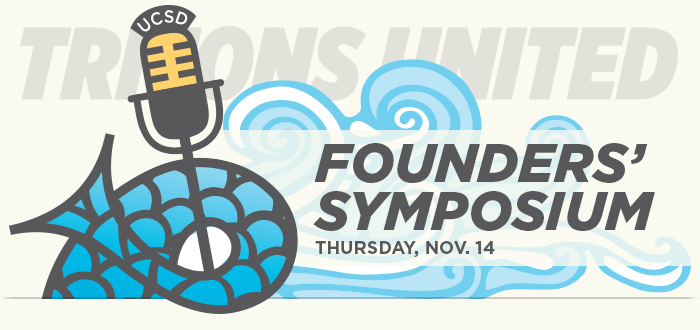
Recognized as one of the top 15 research universities worldwide and first in the nation for commitment to service, social mobility and research, UC San Diego has a culture of collaboration that sparks discoveries that advance society and drive economic impact. The Triton community is a vibrant population of outstanding faculty, students, staff and alumni, all invested in defining a better future for humankind and our world.
Other activities that are part of Founders’ Celebration at UC San Diego include:
- November 12, 2013: Faculty Research Award Lecture
4:30 reception, 5 p.m. lecture in the UC San Diego Faculty Club, featuring Michael Parrish, professor of history in the Division of Arts and Humanities, presenting: “Reconsidering Mr. Justice Frankfurter” - November 19, 2013: Faculty Research Award Lecture
4:30 reception, 5 p.m. lecture in the UC San Diego Faculty Club, featuring William Young, professor at Scripps Institution of Oceanography at UC San Diego presenting: “Long-Range Propagation of Ocean Waves”
The Academic Senate Faculty Research Lecturer Award recognizes colleagues whose research has made a significant contribution to the advancement of knowledge. Each year, the Senate selects two members of the faculty to receive this prestigious award, one from the Arts, Humanities, or Social Sciences, and one from the Sciences. As part of Founders’ Celebration activities, each recipient present a lecture on a topic of his or her choice and is honored by the faculty with a reception prior to the lecture, and receives a $1,500 honorarium.
The celebration of the collective accomplishments of our united community of Tritons will be at the heart of this year’s Founders’ Celebration as we commemorate the founding of our campus in November 1960. The entire campus community is invited to join together to honor the visionaries who founded this remarkable institution and celebrate Tritons around the globe who have contributed to UC San Diego’s trajectory as one of the top universities in the world.
Founders’ Week will kick off Thursday, Nov. 14 with the 4th annual Founders’ Symposium which will offer brief, interactive presentations by six innovative faculty and graduate students who are taking creative approaches to solving some of society’s most pressing challenges. The evening will begin at 4 p.m. with a reception at The Loft that will feature research posters highlighting the innovative work of some of UC San Diego’s best and brightest undergraduate students. The Symposium will begin at 5 p.m. in the Price Center East Ballroom and include a series of five 10-minute presentations followed by a question and answer session moderated by UC San Diego alumna Lauren Reynolds.
Below each speaker provides a glimpse into his or her background, passion, and personal insights that will give you an idea of what you have to look forward to at the Founders’ Symposium. The event is free and open to the public. Seating is limited and will be filled on a first-come, first-served basis. For complete information about Founders’ Symposium, please visit the Founders’ Symposium page.
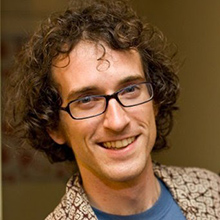
Jamie Alexandre
Graduate Student, Department of Cognitive Science
“Connecting the Disconnected: Taking the Online Learning Revolution Offline”
Tell us a bit about your background: I am a doctoral candidate in the department of cognitive science, advised by Division of Social Sciences Dean Jeff Elman. I am co-founder of several educational technology platforms, including thisCourse, ESL Genie and KA Lite, a software platform that can be installed on almost any device to turn it into a portable, offline learning system. I received my bachelor’s degree in cognitive science from Simon Fraser University in Vancouver British Columbia, Canada, in 2006 and a master’s degree in cognitive science from UC San Diego in 2009. My curiosity about the world and passion for learning were kindled through my time spent as a child at a Waldorf school in Canada, while my love for technology and tinkering were fostered at home, surrounded by machines I could take apart, put back together, and learn to program, with patient support from my parents. I have brought those two interests together by leveraging technological solutions to improve global access to learning opportunities, especially within disadvantaged and isolated communities. Through my work with an inspiring team at the Foundation for Learning Equality, I hope to help bring the online learning revolution to the 65 percent of the world that is still offline.
What will be exciting about your 10-minute talk? When a large, diverse group of deeply motivated people band together to help change the world for the better, it is bound to get interesting. Come to the talk to hear about how we're working to make the world a more equal place and how you could get involved to help make this vision a reality.
What is the impact of your work? Since we launched KA Lite last December, it has been installed in over 84 countries all around the world. Children at schools in Mumbai are discovering the joys of being able to work through materials at their own pace, with instant feedback. Prisoners at correctional facilities in Idaho are re-building their confidence and skills, and passing their math GEDs at unprecedented rates. An orphanage in Cameroon has been transformed into a community learning center. And we’ve only just begun!
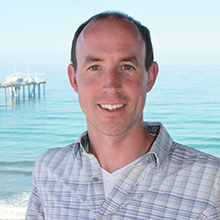
Eric Allen
Associate Professor, Marine Biology Research Division and Molecular Biology Section
“Decoding Our Microbial Planet: From Habitats to Human Health”
Tell us a bit about your background: I am an associate professor of marine biology and molecular biology at the Scripps Institution of Oceanography and Division of Biological Sciences at UC San Diego. I am a faculty affiliate of the Scripps Center for Oceans and Human Health, which studies natural chemicals known as halogenated organic compounds, or HOCs, emerging contaminants found naturally in common seafood as well as man-made chemicals that accumulate in human breast milk. My lab investigates the genomics of environmental microorganisms using high-throughput DNA sequencing approaches and bioinformatic tool development. A primary focus of this research is the discovery and genetic manipulation of microbial biosynthetic pathways involved in the synthesis of marine natural products such as omega-3 polyunsaturated fatty acids. I received my undergraduate degree in biology from the University of Oregon and my doctorate in marine biology at UC San Diego. As a National Science Foundation Postdoctoral Fellow in microbial biology at UC Berkeley, I conducted early research in the emerging field of metagenomics and the biology of extremophilic microorganisms.
What will be exciting about your 10-minute talk? Confronting the unknown and the lure of discovery are powerful motivators that drive human curiosity and scientific exploration. Research in our lab is directly confronting unknowns associated with the largest reservoir of genetic diversity on our planet, the microbial world. It is estimated that there are over 10 million species of bacteria in numbers that likely far exceeds the estimated number of stars in the universe by several orders of magnitude. Our research utilizes contemporary, data-intensive genomic methods to peer into the secret lives of environmental microorganisms that cannot be domesticated (cultured) in the laboratory. In this talk, I hope to convey the enormity of genetic diversity that resides in the hidden majority of life on our microbial planet and highlight how microbial activities in the ocean impact human health.
What is the impact of your work? Technological advances in genome and genome-enabled science have inspired a new paradigm in environmental science. Just as bigger telescopes have enabled us to see farther into the universe, genomics has enabled us to see farther into our own planet's biological universe. Analysis and interpretation of these vast microbial genetic resources is revealing new "sequence space" that, on the one hand, is actively contributing to the discovery of new pharmaceutical and biotechnological products, but also revealing a new appreciation of microbial processes that are vital to planetary homeostasis.
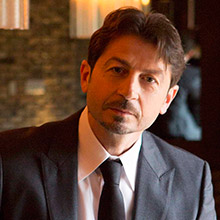
Jacopo Annese
Assistant Professor in Residence, Department of Radiology
“Building a Bigger Brain”
Tell us a bit about your background: I am an assistant professor in residence in the department of radiology. I am a computational neuroanatomist whose formal training stems from a wide background in the biological sciences and the neurosciences. I am experienced in neuroanatomical and histological techniques, as well as computer-aided microscopy and morphometry by image analysis, and have designed novel techniques for the quantitative study of neurological structures with MRI and histology. I received my bachelor’s degree in biology and master’s degree in zoology from the University of Rome. I obtained a master’s degree in neurological sciences at University College London and completed the doctoral program in cognitive neuroscience at Dartmouth College. I have received the prestigious Dana Foundation Brain Imaging Award and was twice nominated for the Science Educator Award (Society for Neuroscience) and the AAAS Early Career Award for Public Engagement with Science.
What will be exciting about your 10-minute talk? I will unveil the plans for a new UC San Diego-based structural map of the human brain that will provide researchers worldwide 2-D and 3-D images containing unprecedented levels of detail. The new map will be based on novel neuroimaging methods developed by me and my team and will leverage current digital and web technologies to enhance remote access and interaction. The proposed UC San Diego-based digital model of the human brain will be the reference template for mapping the results of multiple studies under the BRAIN Initiative (Brain Research through Advancing Innovative Neurotechnologies) announced by the Obama administration in April 2013.
What is the impact of your work? By allowing global access to a complete cellular-level map of the brain, the current project I am working on has the potential to revolutionize the way neuroscientists collaborate and the way the public will view their own brain.
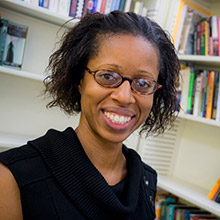
Jessica Graham
Assistant Professor, Department of History
“Envisioning Global Citizens: The Construction of Multiracial Societies in the Americas”
Tell us a bit about your background: I am an assistant professor in the department of history. My research explores the politics of race and nationalism in Brazil and the United States in the 1930s–40s. In the international debates over democracy, fascism and communism, race became one of the key points of contention. As a result of these debates among policymakers and pressure from black social movements, a major shift occurred in the U.S. and Brazil in which racially exclusive ideals increasingly yielded to rhetoric of racial inclusion. My work explores how this shift came about as well as the consequences and limitations for the politics of race and democracy in the two national contexts. I received my doctorate in history from the University of Chicago, a master’s degree in Africana Studies from Cornell University and a bachelor’s degree in African American Studies from UCLA. I have won many fellowships and grants, including a Fulbright-Hays Fellowship, a Trustees Fellowship from the University of Chicago, an Erskine Peters and a Moreau Postdoctoral Fellowship from the University of Notre Dame and a Sage Fellowship from Cornell University.
What will be exciting about your 10-minute talk? My joint presentation with Professor Dana Velasco Murillo will grant us the opportunity to provide a very broad and engaging discussion about multiracial societies in the Americas. We live in a world in which people of all races and nationalities are constantly in contact, phenomena that are accelerated by the internet, tourism, immigration, international commerce or transnational collaborations. Our lecture places these contemporary realities in historical context, encouraging an introspective look at our own life and times. In doing so, the past becomes alive and relevant and the present is better understood with the help of historical precedent. This, for me, is what makes history so exciting.
What is the impact of your work? My research helps to unravel a fundamental question of the 20th century: How and why did the two largest nations in the Americas come to replace racially exclusive notions of democracy with racially inclusive ideals? Looking at the United States and Brazil from 1930-1945, I contend that the governments in both countries began to promote racial pluralism as a way to manage a series of perceived crises: communism, fascism, World War II, and black agitation for equality. As a result, my work provides a more comprehensive understanding of the racial and political consequences of this extremely transformative and impactful moment in the history of both nations.
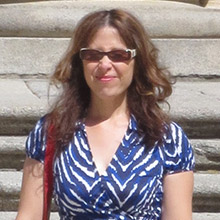
Dana Velasco Murillo
Assistant Professor, Department of History
“Envisioning Global Citizens: The Construction of Multiracial Societies in the Americas”
Tell us a bit about your background: I am an assistant professor in the department of history at UC San Diego. My research interests center on the intersections of colonialism with gender, ethnicity and identity formation in early Latin America. I specialize in the social history of colonial Mexico, particularly the responses of indigenous peoples to Spanish rule. I received my doctorate from UCLA and was an assistant professor of Latin American history at Adelphi University and UC Presidential Postdoctoral Fellow at UC Irvine. I am on the executive committee of the Rocky Mountain Council for Latin American Studies and my research has received support from a variety of institutions and fellowships, including an American Philosophical Society Franklin Research Grant and the Conference on Latin American History Lewis Hanke Post-Doctoral Award.
What will be exciting about your 10-minute talk? I often tell people that historians are like paper archeologists. One of the best aspects of my job is working in archives in Mexico and Spain searching for information on the past in documents that are hundreds of years old. I look forward to presenting some of the documents and images from my archival work to the UC San Diego community.
What is the impact of your work? Professor Jessica Graham and I included the phrase “Global Citizens” in our symposium presentation title because technology, media and transportation have given students unprecedented access to different places and peoples. Yet, in many ways we continue to know very little about societies and cultures around the globe. Historical research helps to fill these gaps. It provides students with content, ideas and perspectives from different time periods and places, giving them the necessary knowledge and awareness to become global citizens.
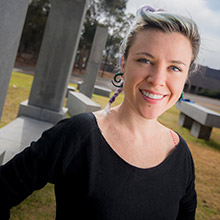
Morgan Nunn Martinez
Graduate Student, Department of Chemistry and Biochemistry
“Cosmochemistry Can Save Lives”
Tell us a bit about your background: I am doctoral candidate in the department of chemistry and biochemistry, working in the lab of Mark Thiemens. My research involves extracting and analyzing water in extraterrestrial samples. I have measured the oxygen isotopic composition of water bound in meteorites from asteroids and Mars and rock and soil samples from the moon and these studies will be used to refine theories of how water formed and was distributed throughout our solar system. I grew up in South Carolina and Georgia and received a bachelor of science in chemistry from the Georgia Institute of Technology.
What will be exciting about your 10-minute talk? I’ll be talking about rocks from outer space and how scientists use studies of the chemical makeup of these rocks to better understand the celestial bodies from which they originate. I will talk about how my analysis of water in ancient rocks that survived the fiery entry through our atmosphere from Mars, the moon, and the asteroid belt is crucial to understanding how life evolved in our solar system. I'll also explain the significance of these and related studies in our everyday lives.
What is the impact of your work? The research I've done as a graduate student here at UC San Diego will be used to place constraints on theories of how our solar system formed and to get you excited about science. Scientific research and discoveries have much to teach us, regardless of chosen profession, and I'll share with you the specific lessons I believe cosmochemistry has to offer us.
Share This:
You May Also Like
Stay in the Know
Keep up with all the latest from UC San Diego. Subscribe to the newsletter today.



